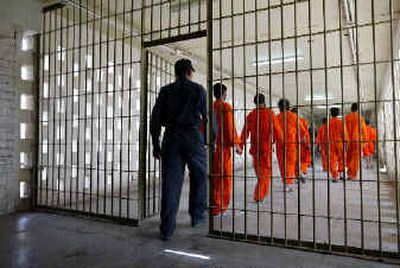Iraqis working to redefine Abu Ghraib

ABU GHRAIB, Iraq – In the cellblock where a worldwide scandal began, an eerie silence prevails as ceiling fans whip the furnance-like air across the fresh paint and new Chinese locks.
A handful of common criminals spend their days in quiet solitary confinement, a sharp contrast to the reports of torture and executions under Saddam Hussein and of sexual abuse at the hands of U.S. soldiers.
The prison’s new Iraqi administration is trying to remake the image of the huge jail on Baghdad’s western outskirts. An Associated Press reporter and photographer, escorted by American and Iraqi officials Saturday, got the first outsider’s glimpse of the new version of prison life inside the lockup.
“The building itself isn’t evil. It’s just a question of who’s running it,” said its newly appointed warden Bassim, a prison employee for 25 years under Saddam. Bassim refused to allow use of his full name and declined photographs, fearing he would be recognized.
The infamous sections 1A and 1B were the sites of U.S. abuse of political prisoners, but now they hold troublemakers and problem inmates.
The entire Iraqi-controlled section of the prison holds 1,200 inmates, but most don’t know it was the place of former abuse. Neither do most of their jailers.
The knowledge, overseers say, would only be ammunition for those determined to undermine postwar reconstruction and attack Iraqis cooperating with American occupiers.
The U.S. Coalition Provisional Authority took charge of the prison after the military failed to quell riots in April. It handed control to the Iraqis in June, before the official transfer of sovereignty.
“They’re running the place the way we would typically run a U.S. prison,” said Mike Pannek, the U.S. warden adviser who led the walkthrough. He was brought in from his job as a warden in his hometown of Spokane to administer and now advise the Iraqis.
Political detainees remain under U.S. control in Camp Redemption, a city of tents beyond the prison’s walls. But the criminal offenders live inside the prison itself, supervised by 480 corrections officers.
While conditions have improved, it is far from perfect. Five Iraqi prison officers were recently arrested for trying to smuggle drugs in to prisoners. Some inmates have been incarcerated for more than a year and are still waiting for their cases to be reviewed.
Officials from Iraq’s Human Rights Ministry visit weekly, and they slowly work through the cases to determine who stays and who goes.
In most cells, lethargy chokes the air. Temperatures during Iraq’s summer reach 122 degrees. Many of the men wear long white shorts and little else as they lie sprawled on foam mattresses on the floor. Metal bunks were removed after prisoners, during riots in April, made knives from the iron and pried locks open.